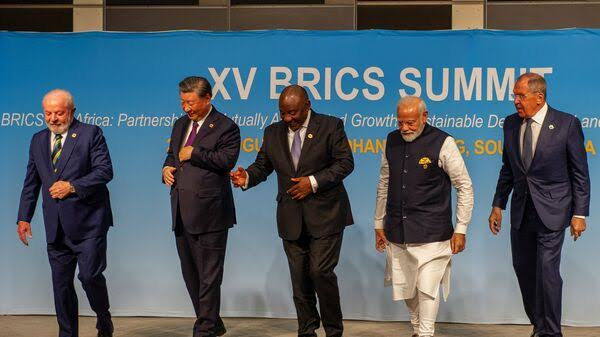World
Trump issues major threat to BRICS nations over moves to dump U.S. dollar

President Donald Trump reiterated his warning to BRICS nations on Thursday, threatening to impose 100% tariffs if they attempt to introduce a new currency to challenge the U.S. dollar’s dominance.
“We are going to require a commitment from these seemingly hostile Countries that they will neither create a new BRICS Currency, nor back any other Currency to replace the mighty U.S. Dollar or, they will face 100% Tariffs,” Trump stated on Truth Social.
His message closely mirrored a similar warning he issued on November 30.
In response to previous U.S. pressure on the dollar’s role, Russia had warned that such efforts could backfire.
READ ALSO:Trump’s proposal for Palestinians rejected by Jordan, Hamas
The BRICS alliance—comprising Brazil, Russia, India, China, and South Africa—has been discussing alternatives to the dollar for years. These conversations have gained traction, particularly after Western nations imposed sanctions on Russia following its invasion of Ukraine. While the bloc has yet to establish a unified currency, momentum for de-dollarization has increased.
“There is no chance that BRICS will replace the U.S. Dollar in International Trade, or anywhere else, and any Country that tries should say hello to Tariffs, and goodbye to America!” Trump added.
Trump’s warning comes as Canada and Mexico await his decision on whether to impose 25% tariffs on U.S. trade partners starting February 1.
He has argued that such tariffs could pressure both countries to curb illegal drug trafficking and unauthorized immigration into the United States.
Despite rising discussions of de-dollarization, the U.S. dollar’s dominance in global trade remains strong. A study by the Atlantic Council’s GeoEconomics Center last year found that neither the euro nor BRICS currencies have significantly reduced global reliance on the dollar.
The BRICS bloc was initially formed as an informal alliance in 2009, building on a concept introduced by former Goldman Sachs economist Jim O’Neill in 2001. Originally consisting of Brazil, Russia, India, and China, the group expanded in 2010 with the inclusion of South Africa. It has since welcomed additional members, with Egypt, Ethiopia, Iran, and the United Arab Emirates joining in 2023, followed by Indonesia earlier this month.
























